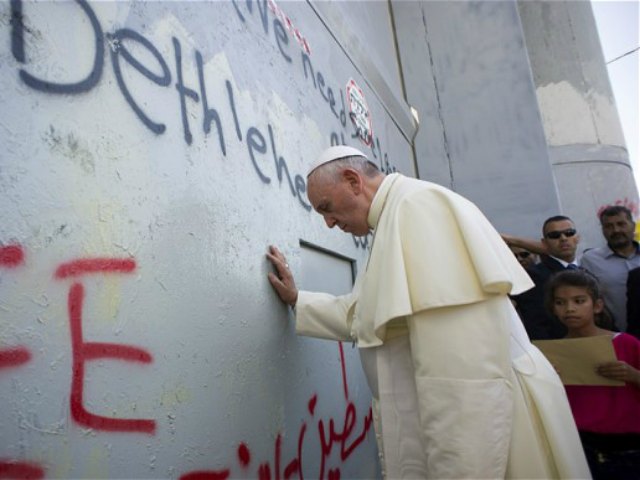No one can deny that Pope Francis is a man who walks the walk. While many disagree with his neo-socialist world-view, who can feel anything but respect for a world leader who eschews the perks of office to champion the poor and the oppressed?
The Pope is also courageously confronting the Church’s obsession with abortion, gay marriage, and contraception in favor of spiritual values that directly address the materialism, narcissism, and rot of the modern world.
But there is one area where the Pope must do more. And that’s in his confrontation with evil.
Over the past few days we’ve heard the Pope repeatedly invoke the need for Middle East peace. We have seen him walk a tightrope of neutrality between Israel and the Palestinians. But as the world’s foremost religious voice, can he afford to be silent in the face of a grotesque moral affront?
When the Pope prays at an Israeli security barrier in front of graffiti that compares Bethlehem to the Warsaw Ghetto, he has taken neutrality to an extreme and risks being party to trivializing the Holocaust.
This past January I visited the remnants of the Warsaw Ghetto in the deep and freezing snow of Poland’s winter. It traumatized me to the bone. I found approximately five portions of the Ghetto wall, Yanusz Korchak’s original orphanage, the last remaining Synagogue, and the square from which the 300,00 Jews were deported from the ghetto to their deaths in Treblinka. Not that they weren’t already the living dead.
The photo and film archive of Emanuel Ringelblum, at the former site of the Grand Synagogue’s Library, is shocking beyond words. The discarded bodies that dotted the streets of the ghetto are haunting enough. But even worse is the footage of small children, clad in the dead of winter in nothing but rags, walking alone and barefoot and begging for bread.
It is something that sears the soul and has the viewer asking how God could have allowed such unspeakable suffering. I was covered in many layers and was still shivering. I have no idea how these children survived for even a day.
I also visited the mass grave at Mila 18, headquarters of the armed Jewish resistance of April-May 1943, known to us today as the Warsaw Ghetto uprising. There I was nearly knee-deep in snow, the only visitor in perhaps days, making fresh prints by the monument to the great Mordechai Anielewicz, who headed the uprising and, surrounded by the Nazis who were about to storm the position, took his own life along with other leaders of the revolt.
To compare the annihilation of the 300,000 Jews of the Warsaw Ghetto to a security fence erected by Israel so that more Jews aren’t gruesomely murdered takes a particular kind of propaganda effort, one that has contempt for human life, one that is indifferent to evil. Surely the Pope cannot agree with the appalling, disgusting, and vile assertion that Bethlehem is a holding pen for Palestinians awaiting Israeli slaughter. So why would the Pope have prayed there?
Pope Francis just canonized John XXIII and John Paul II, both courageous friends of world Jewry. He pointedly, and to his credit, did not canonize Pope Pius XII, the man universally derided as “Hitler’s Pope.”
Evil ensues when nobody speaks against it and genocides take place when people are silent. This was the great sin of Pope Pius, a man whose refusal to use this global standing to denounce Hitler and a mysterious insistence on remaining above the fray in the great battle of light versus darkness, bespoke a broken moral compass.
Hitler famously said at the start of the Holocaust, in 1939, “Who, after all, speaks today of the annihilation of the Armenians?” He banked on moral voices remaining silent in the face of Jewish European mass murder. Eugenio Pacelli, who became Pope that same year, obliged him by never once objecting to the destruction of European Jewry and lives, therefore, in moral infamy till this day.
Pius XII was famous for making benign pronouncements during the war that carefully preserved his moral neutrality. “Nothing is lost with peace; all can be lost with war. Let men return to mutual understanding! Let them begin negotiations anew, conferring with good will and with respect for reciprocal rights… Christ made love the heart of his religion.” These empty platitudes were utterly useless in preserving peace because they refused to lay the blame for the war firmly at Nazi aggression.
Even after Germany invaded Poland on September 1, 1939, and began what would be six years of global conflict and mass slaughter, Pius avoided words of condemnation of any party. For the Pope, the allies and the Nazis were equally culpable.
The most the Pope Pius ever said that even approached a condemnation of the annihilation of the Jews was in a Christmas message of 1942 where he spoke of “those hundreds of thousands who, without any fault on their part, sometimes only because of their nationality or race, have been consigned to death or to a slow decline.” Incredibly, he never once said he was referring to the Jews.
Pope Francis, who is a global inspiration and a great light of the Church, must learn from the poor example of his predecessor not be vague when it comes to mass murder. Platitudes about Middle East peace that refuse to condemn Hamas terrorism or its genocidal charter against the Jews risks compromising the great Pope’s moral standing.
A security fence built solely to protect innocent Israelis from being dismembered dare not be compared to a fence designed to cage Jews prior to their gassing.
The Pope can surely find a different place to pray.
Rabbi Shmuley Boteach is founder of This World: The Values Network, the foremost organization influencing politics, media, and the culture with Jewish values. He has just published Kosher Lust: Love is Not the Answer. Follow him on Twitter @RabbiShmuley.

COMMENTS
Please let us know if you're having issues with commenting.